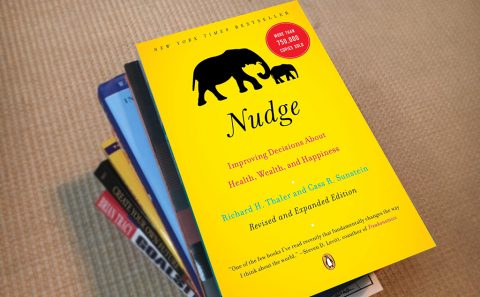The idea
The authors start from the premise that the judgments and decisions people make often lack rationality (you probably already wondered sometimes “how come these people took THIS decision, whereas everybody knows THAT decision would have been so much better?”) . Thaler and Sunstein explain the choices people make, are very much influenced by how these choices were presented (i.e. the ‘choice architecture’). Whether you want it or not, whether you’re conscious about it or not, whenever you present a choice to somebody, there are very small things about how you present this choice that will have a direct influence on the ultimate decision people make. Understanding these very small things (called ‘nudges’) will help you guide people towards the ‘best’ decision (while still giving them the freedom of choice). A powerful way to influence others.
Who will like this book
Leaders wanting to know how to influence others (for the better).
What we like about the book
- The book reads very well
- It is well structured
- It’s backed up with lots of research
- It provides lots of ‘aha’ moments
- The insights are very practical
- Lots of takeaways that you can integrate in business life
What you will learn in this book
The book ‘Nudge’ starts by explaining why and how to help people make ‘good decisions’:
- Why it is useful to help people decide ‘well’ : The book provides insight in what makes it so difficult for people to decide rationally (as you will read, obstacles include loss aversion, status quo bias, temptation, mindless activities, the desire to conform, …)
- When it is helpful to provide guidance: The authors explain in what types of situations this guidance if especially helpful (quick answer: it’s decisions that are difficult, infrequent, ‘fuzzy’ and without immediate feedback)
- How to intervene: The book provides six principles of good choice architecture. The first letters of these 6 principles form the word ‘NUDGES’. They are presented in a very pragmatic way.
The authors then look at several specific situations, and explain what nudges have helped or could help people decide for the better. This helps to test the concepts with practical cases. Very insightful.
Extracts
-
“The picture that emerges is one of busy people trying to cope in a complex word in which they cannot afford to think deeply about every choice they have to make”
-
“If choice architects want to shift behavior and to do so with a nudge, they might simply inform people about what other people are doing ”
-
“When people are asked what they intend to do, they become more likely to act in accordance with their answers”
-
“When choice is complicated and difficult, people might greatly appreciate a sensible default”
-
“Seemingly small features of social situations can have massive effects on people’s behavior; nudges are everywhere, even if we do not see them.”
You can find the book ‘Nudge’ on amazon and other online bookstores. Click on the image to shop:
TITLE: Nudge: Improving Decisions About Health, Wealth, and Happiness
AUTHOR: Richard H. Thaler & Cass R. Sunstein
Richard H. Thaler was awarded the 2017 Nobel Prize in Economics. He is the Charles R. Walgreen Distinguished Service Professor of Behavioral Science and Economics at the University of Chicago’s Booth School of Business, where he is the director of the Center for Decision Research. He is also the co-director (with Robert Shiller) of the Behavioral Economics Project at the National Bureau of Economic Research and in 2015 was the president of the American Economic Association. He has been published in several prominent journals and is the author of a number of books, including Misbehaving: The Making of Behavioral Economics.
Cass R. Sunstein is the Robert Walmsley University Professor at Harvard Law School, where he is the founder and director of the Program on Behavioral Economics and Public Policy. He is by far the most cited law professor in the United States. From 2009 to 2012 he served in the Obama administration as Administrator of the White House Office of Information and Regulatory Affairs. He has testified before congressional committees, appeared on national television and radio shows, been involved in constitution-making and law reform activities in a number of nations, and written many articles and books, including Simpler: The Future of Government and Wiser: Getting Beyond Groupthink to Make Groups Smarter..

